_.--""--._
/ _
_ \
_ ( (_\ /_) ) _
{ \._\ /\ /_./ }
/_"=-.}______{.-="_\
_ _.=("""")=._ _
(_'"_.-"`~~`"-._"'_)
{_"
"_}
ASIAN EDITION
A Conference on
Media Piracy and
Intellectual Property in South East Asia
Sponsored by the
Goethe Institut, Manila, and the UP Film
Institute
Date:
November 24, 2006, 9:00 am – 5:00 pm, UP Film
Institute, University of the Philippines, Diliman, Metro
Manila, CMC Auditorium, Plaridel Hall
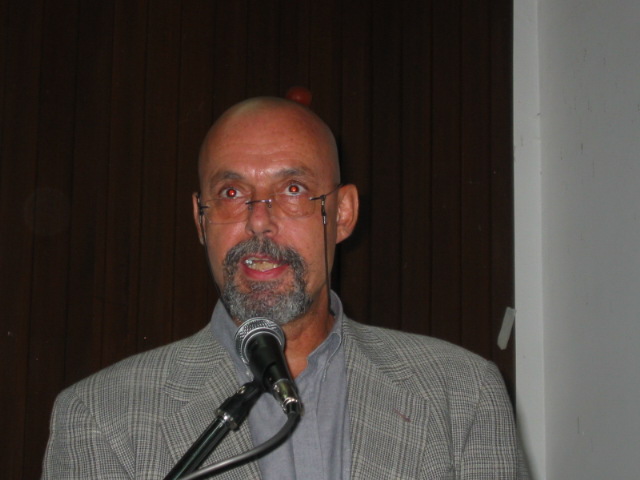
Volker Avenmarg
Volker Avenmarg is the director of the Goethe Institute in Manila.
Website
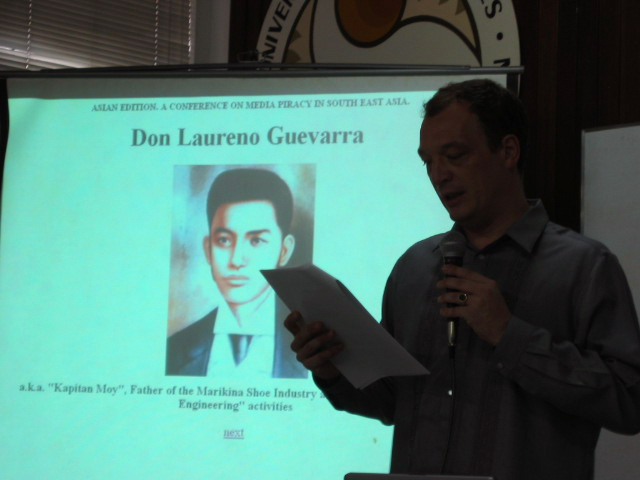
Tilman
Baumgärtel, media scholar and curator, Manila/Berlin
The German media scholar and
curator Tilman Baumgärtel currently teaches at the Film
Institute
of the University of the Philippines. He lives in Berlin and Manila and
has published widely on cinema and digital art. He has curated a number
of exhibitions on new media art and has taught media aesthetics at the
University of Paderborn, Technische Universität, Berlin and
the
Mozarteum in Salzburg (Austria). Publications include Games. Computerspiele von
KünstlerInnen, Frankfurt/Main 2003 (Games.
Computer Games by artists; exhibition catalogue) and net.art 2.0
- Neue Materialien zur
Netzkunst / net.art 2.0 - New Materials towards Art on the Internet,
Nürnberg 2001.
Website
Khavn De La Cruz, film
maker, Manila
One of the most prolific
independent film makers in the Philippines, Khavn de la Cruz was also
among the first to employ digital film. Khavn has made nine digital
features and more than thirty short films; several of which have won in
the Philippine Independent Film Festival, the Tokyo Video
Festival, the Cinemanila Festival and generally more festivals than
anybody can count. He was selected in the Talent Campus Programme of
the Berlin International Film Festival and the Hubert Bals Fund of the
Rotterdam International Film Festival. His
award-winning digital
productions include "Slippers and Can", "Our daily bread" and most
recently "Squatter Punk". He is also a terrific piano player.
Website
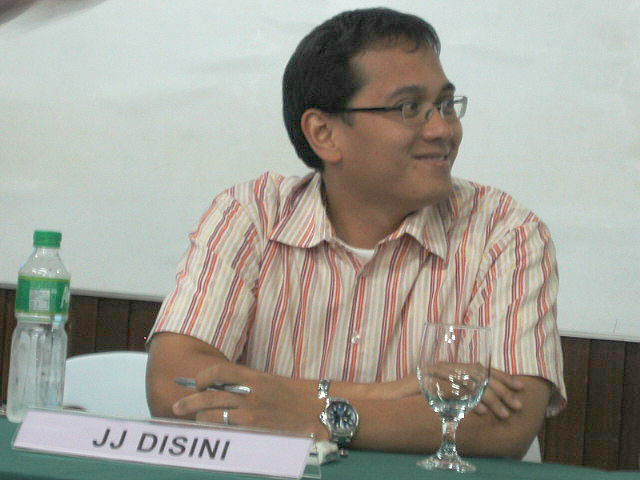
JJ
Disini
A lawyer
and professor
at the university of the Philippines, he has published widely on open
source software, copyright and related matters. JJ Disini has MAster of
Law from Harvard University and is a partner in Disini & Disini
Law
Office. He
is a member of the Free Software Foundation, the Computer Law
Association and Creative Commons Philippines.
Website
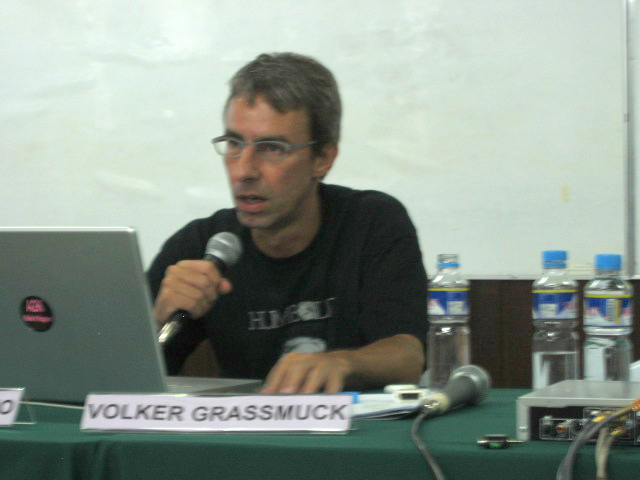
Volker Grassmuck, sociologist,
Berlin
Volker Grassmuck is a sociologist
and media researcher at the Helmholtz Center for Cultural Technology of
Humboldt University Berlin. His main area of interest is the digital
revolution, intellectual property and free knowledge. Previous areas of
research include artificial intelligence, garbage, the history of media
and identity discourses in Japan, and the knowledge order of digital
media. He is the project lead of the copyright information portal
iRights.info and of the conference series "Wizards of OS", a freelance
writer and an activist. As co-initiator of privatkopie.net he is
campaigning to promote user rights and freedoms in the ongoing
copyright law reforms. His publications include Freie Software zwischen Privat-
und Gemeineigentum (Bonn 2002).
Website
Anne Marie de Guzman
Anne de Guzman is the head of the Film Institute at the College of
MassComm at the University of the Philippines.
Website
Fatima
Lasay, artist, Manila
The media artists has addresses issues of technology and ownership in
her work.
She has published extensively about the significance of regimes of
ownership
for emerging countries such as the Philippines, and has been an
important
advocate for open source software at the University of the Philippines,
where
she developed and taught the first media art curricula at the College
of Fine
Arts. She was an organizer of the Digital Media Festival in Manila and
has
curated a number of exhibitions, both online and in art spaces such as
the
Atteneo Art Gallery.
Website
Raul
Pertierra, sociologist, Manila
Has published extensively on media issues in the Philippines, including
TXTing selves,
a
ground-breaking book on the TXTing mania in the Philippines, the first
book on
the topic. He teaches at the Asian Center at UP and at the Ateneo.
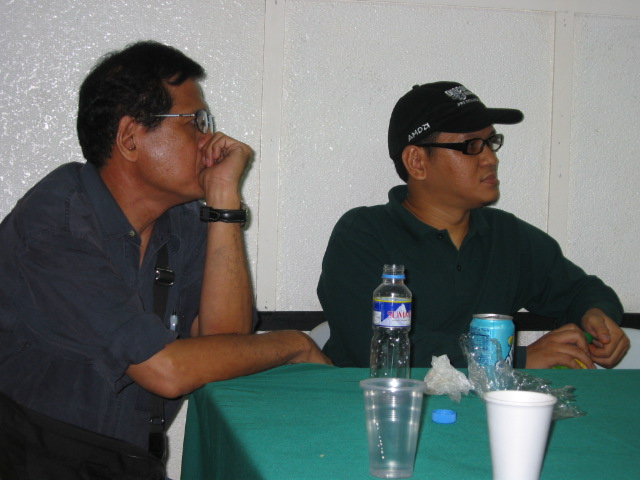
Raymond Red, film
director, Manila
One of the most important
independent film makers in the Philippines, Raymond Red has
been
at the forefront of independent filmmaking in the
Philippines. His
first film, Ang
magpakailanman/eternity,
shot in Super 8 in early eighties won major awards at the first Short
Film Festival sponsored by the Experimental Cinema of the
Philippines. His subsequent workds, either in Super 8 or 16
mm,
like Kabaka,
Kamada, Pelikula
and others earned great acclaim in Asia and in Europe. In
early
nineties, he made his first feature length film (shot in 35 mm), Bayani/patriot, a
film about Philippine hero-revolutionary, Andres Bonifacio and then
followed by Sakay,
a film about another hero, Makario Sakay. In 2000, Red became the first
filipino filmmaker to win the Cannes Film Festival prize with Anino/Shadows, the
Cannes Palme D’Or for Short Film.
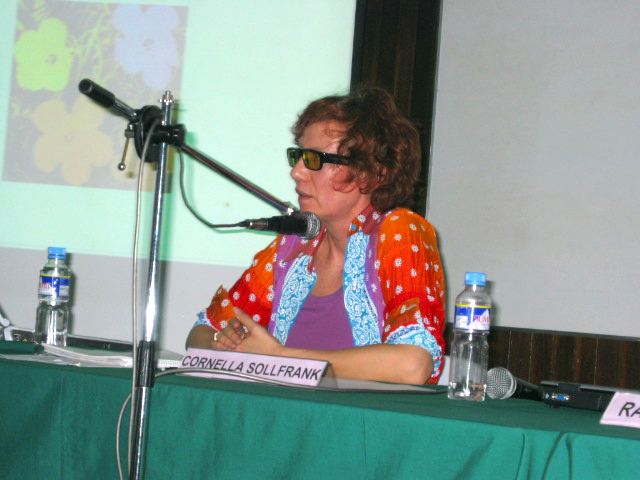
Cornelia Sollfrank, artist, Hamburg
The central concerns in the
conceptual and performative works in 'mixed media' of the German artist
are the advent of a new image of the artist in the information age and
communication as art. She has extensive experience with the subject of
intellectual property, because part of her artistic project concerns
itself with the appropriation and manipulation of media images. These
concern went so far that some of her works actually had to be cleared
by lawyers before they could be shown in public.
Website
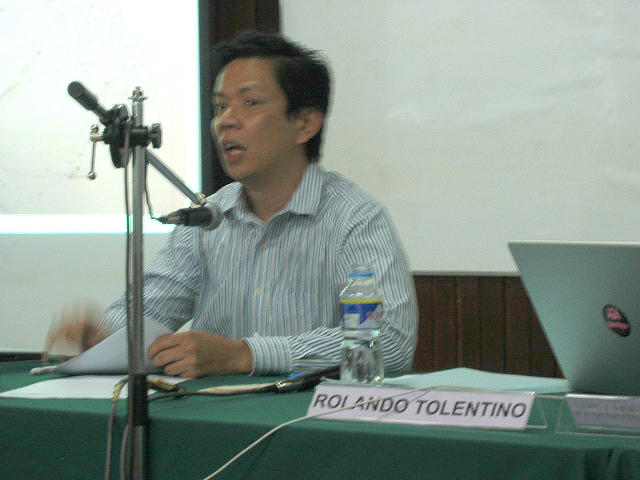
Roland
Tolentino, media scholar, Manila/Singapore
The former director of the UP film institute is currently teaching at
the National University
Singapore. His critical writings on Philippine films and media has been
published both in local and international reviews. His publications
include
Geopolitics of the
Visible, Articulations
of the Nation Space: Cinema, Cultural
Politics, and National/Transnational.
Subject Formation and Media in and on the
Philippines.

Roberto Venzola,
programmer and political activist, Manila
In the last months, Robert
Venzola was frequently interviewed in the Philippine media, because of
his analysis of the believed election fraud during the last elections.
However, Venzola has been involved with digital media since the period
of online-bulletin boards in the second half of the 80ies. His highly
critical writing on the economic status quo of the information society
and the power of international “information lords”
has
brought him international attention, and he is a frequent speaker on
conferences and conventions all over the world.